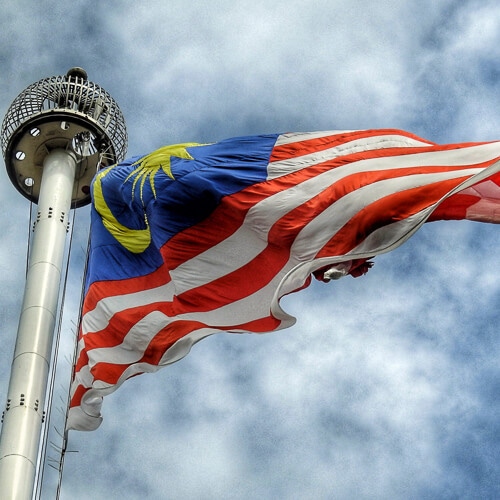
Malaysia is moving ahead with its ambitious plan to build a single national 5G network – but government officials haven't yet explained how it will be funded.
Digital Nasional Bhd (DNB), a special purpose vehicle created by the Finance Ministry to drive the process, has called for bids from eight vendors: Ericsson, Nokia, Huawei, ZTE, Samsung, NEC, Cisco and Fiberhome.
"These companies are expected to give their views on building Malaysia’s national 5G network, and are also expected to come up with end-to-end solutions that will address the country’s 5G needs," a source told Edge Markets.
Figure 1:  Fly the flag: Malaysia has big plans for 5G – but who will pay for it is less clear.
Fly the flag: Malaysia has big plans for 5G – but who will pay for it is less clear.
(Source: mkjr_ on Unsplash)
It's a plum contract for the winning vendor, offering the chance to design and build the world's first 5G wholesale network.
If it succeeds in its goal of creating an affordable but robust path to 5G, it is a model that other emerging markets may embrace.
But it brings some challenges of its own, like providing scaleable nationwide connectivity through a single network. The task becomes Himalayan if that network is expected to be standalone.
Choices, choices
With the first services planned to be up and running by year-end, it seems the early rollouts will be non-standalone (NSA). But that means ensuring connectivity will seamlessly default to one of four different LTE networks if 5G is not available – another daunting challenge.
DNB has said it is looking to complete the vendor selection by the middle of the year.
The early deployments are slated to be in the national government seat of Putrajaya, high-tech district Cyberjaya and some parts of Kuala Lumpur, Edge Markets reported. It will be expanded to 17 major cities across the country over the next two years.
DNB will hold the spectrum rights and will own and manage the single 5G infrastructure via a wholesale model for the next ten years.
Want to know more about 5G? Check out our dedicated 5G content channel here on Light Reading.
It has a RM15 billion (US$3.6 billion) budget for the rollout, but there is no clarity at all as to how this will be funded.
Finance Minister Zafrul Aziz has said it will be privately funded, but newly appointed DNB CEO Augustus Ralph Marshall, the former head of local media company Astro and cellco Maxis, has said he expects it will be government-funded.
Ralph said in an interview two months ago that DNB would likely frontload its network investment, with 25% spent in the first two years and 15% to 20% in the subsequent years.
Malaysia's 5G process has already been chaotic enough, with the government announcing then retracting 5G licenses in the space of 24 hours last June.
Now is probably a pretty good time to explain to the bidders, the industry and consumers how this critical project is going to be paid for.
Related posts:
— Robert Clark, contributing editor, special to Light Reading
Read more about:
AsiaAbout the Author(s)
You May Also Like











